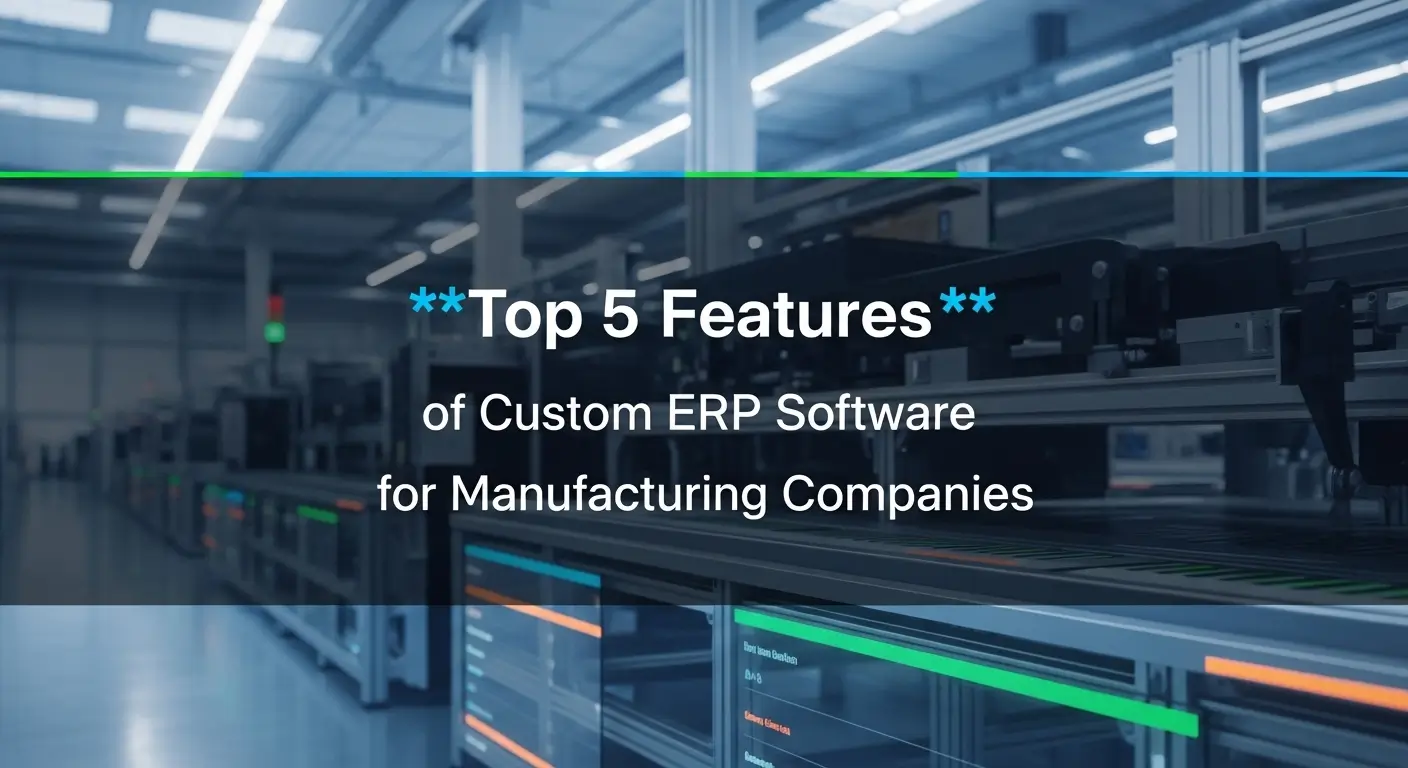In today’s highly competitive and fast-paced manufacturing landscape, staying ahead requires more than just efficient production lines; it demands a seamlessly integrated and intelligent operational backbone. This is where a custom ERP (Enterprise Resource Planning) software comes into play. Unlike off-the-shelf solutions, a custom ERP is specifically designed to meet the unique and complex needs of your manufacturing business, from the factory floor to the front office. It eliminates data silos, automates repetitive tasks, and provides real-time insights, all of which are critical for driving growth and profitability.
This article delves into the top five features of custom ERP software that are essential for any manufacturing company looking to optimize its operations, enhance productivity, and gain a significant competitive advantage.
1. Advanced Production Planning and Scheduling
At the core of any manufacturing operation is the production process. A custom ERP’s strength lies in its ability to provide advanced production planning and scheduling capabilities that are tailored to your specific workflows. This feature moves beyond simple task management to a dynamic, data-driven system that optimizes every step of the production cycle.
- Bill of Materials (BOM) Management: A custom ERP can handle complex, multi-level BOMs with ease, providing a clear framework of the components, raw materials, and routing stages required for each finished good. It allows for quick duplication and adjustment of BOMs, which is crucial for companies with a diverse product portfolio or those that frequently modify products.
- Material Requirements Planning (MRP): This is a game-changer for inventory management. The system uses sales forecasts, demand data, and production schedules to automatically calculate the exact materials and quantities you need. It can then generate purchase orders and production orders, ensuring you have the right resources at the right time, preventing both overstocking and costly production delays.
- Real-time Shop Floor Visibility: A custom ERP provides a centralized dashboard that offers real-time visibility into your production lines. You can monitor the status of work orders, track machine runtimes, and allocate resources based on live data. This allows you to quickly identify and address bottlenecks, ensuring a smooth and efficient workflow.
2. Comprehensive Inventory and Warehouse Management
For manufacturers, inventory is both a major asset and a significant liability. Managing it effectively is a delicate balancing act. A custom ERP system provides comprehensive inventory and warehouse management tools that give you granular control and real-time visibility, from raw materials to finished goods.
- Automated Tracking: The software tracks every movement of inventory, whether it’s raw materials arriving at the warehouse or finished products being shipped out. By integrating with barcode scanners or RFID technology, it ensures data accuracy and eliminates the need for manual, error-prone tracking.
- Optimized Stock Levels: The ERP uses data from your sales, production, and supply chain to determine optimal reorder points. It can automatically generate alerts or even purchase orders when stock levels fall below a certain threshold, ensuring you never run out of critical components.
- Batch and Serial Number Traceability: For industries with strict regulatory compliance, like food and beverage or pharmaceuticals, traceability is non-negotiable. A custom ERP allows you to assign and track batch and serial numbers, providing an invaluable audit trail for quality control and recall management.
3. Integrated Supply Chain and Vendor Management
The modern supply chain is a complex web of interactions. A custom ERP software helps you manage this complexity by providing an integrated platform for supply chain and vendor management. It brings together your purchasing, logistics, and supplier relationships into a single, cohesive system.
- Automated Purchasing: Based on the MRP functionality, the ERP can automate the process of creating and sending purchase orders. This reduces administrative overhead and ensures timely procurement of materials.
- Vendor Portal and Communication: A well-designed custom ERP can include a dedicated vendor portal. This allows for seamless communication with your suppliers, enabling them to track order statuses, submit invoices, and access necessary documentation, which fosters stronger and more collaborative relationships.
- Proactive Delay Management: The system can track incoming orders and alert you to potential delays from suppliers. This allows you to proactively adjust your production schedule or find alternative suppliers, mitigating the risk of operational disruptions.
4. Robust Financial and Accounting Integration
Siloed financial data is a common problem for many manufacturing companies. A custom ERP solves this by integrating all your financial and accounting processes directly with your operational data. This feature provides a single source of truth, giving you a clear, real-time view of your company’s financial health.
- Real-time Costing: The ERP system can automatically calculate production costs at every stage, including raw materials, labor, and overhead. This provides accurate and immediate insights into the profitability of each product and helps you make better pricing decisions.
- Automated Invoicing and Payroll: The software can automate accounts payable and receivable, as well as payroll functions. This not only reduces the risk of human error but also frees up your finance team to focus on strategic analysis rather than manual data entry.
- Comprehensive Financial Reporting: With all your data centralized, the custom ERP can generate a wide range of financial reports—from balance sheets and income statements to customized profitability reports for specific product lines or projects. This allows for faster, more informed decision-making.
5. Enhanced Quality Control and Compliance
For manufacturing companies, maintaining product quality and adhering to regulatory standards are paramount. A custom ERP system is a powerful tool for building quality assurance directly into your processes and ensuring enhanced quality control and compliance.
- Quality Checkpoints: You can configure the system to include quality control checkpoints at specific stages of the production process. If a product fails an inspection, the system can automatically halt the process and generate an alert, preventing the issue from escalating.
- Audit Trails: The ERP maintains a detailed audit trail for all activities, from material sourcing to final product assembly. This is crucial for satisfying regulatory requirements and providing a complete history of every product manufactured.
- Real-time Performance Monitoring: The software can monitor key performance indicators (KPIs) related to quality, such as defect rates and rework times. This data provides valuable insights that can be used to identify trends, pinpoint the root cause of issues, and implement corrective actions to continuously improve product quality.
Why a Custom ERP is the Right Choice for Your Manufacturing Business
Choosing an ERP system is a significant investment, but the benefits of a custom solution are undeniable. While off-the-shelf software offers a generic set of features, a custom ERP for manufacturing companies is a strategic asset. It is built to address your specific challenges, automate your unique workflows, and scale with your business as it grows. By partnering with a leading enterprise software development company to implement a system with these five core features, you’re not just buying software; you’re investing in a smarter, more efficient, and more profitable future for your company.
Don’t let outdated systems hold your business back. It’s time to explore how a custom ERP can transform your operations and empower your team to achieve new levels of success.
Ready to revolutionize your manufacturing processes and unlock your company’s full potential? Contact us today for a personalized consultation and discover how our custom ERP solutions can be tailored to fit your unique needs.



